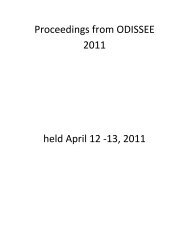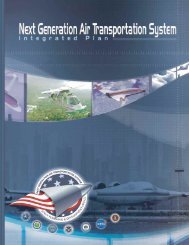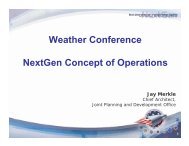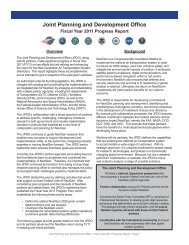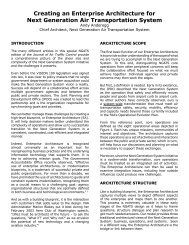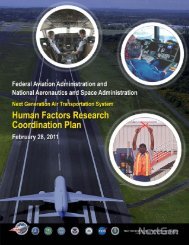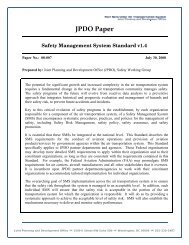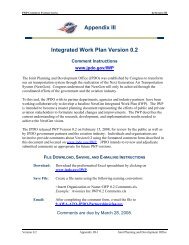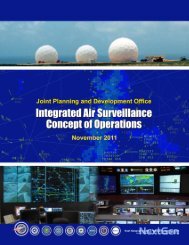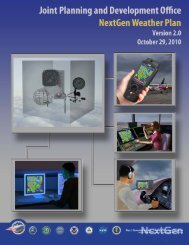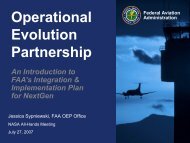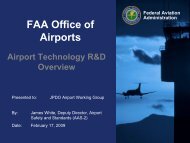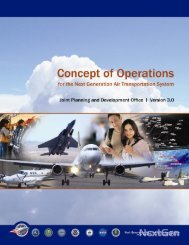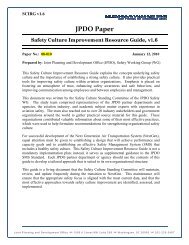Trajectory-Based Operations (TBO) - Joint Planning and ...
Trajectory-Based Operations (TBO) - Joint Planning and ...
Trajectory-Based Operations (TBO) - Joint Planning and ...
Create successful ePaper yourself
Turn your PDF publications into a flip-book with our unique Google optimized e-Paper software.
<strong>Trajectory</strong>-<strong>Based</strong> <strong>Operations</strong> (<strong>TBO</strong>)<br />
Study Team Report<br />
18.25 <strong>TBO</strong> Policy Recommendations<br />
There are some overarching policy recommendations being made that support a better definition of the<br />
operational aspects of <strong>TBO</strong>.<br />
Recommendation <strong>TBO</strong>-38<br />
The <strong>TBO</strong> Study Team recommends resolution of Best-Equipped, Best-Served (also known as<br />
performance-based operations) as an operational incentive for equipage, <strong>and</strong> that it should be applied<br />
relative to <strong>TBO</strong>. Collaboration with the operator community—airlines, GA, military—is required if<br />
support for <strong>TBO</strong> operations is to be realized. (IWP Policy references: PI-0014 – Aircraft Equipage, PI-<br />
0007 – Rules of the Road)<br />
Recommendation <strong>TBO</strong>-39<br />
<strong>TBO</strong> offers the opportunity to use computer automation to separate aircraft. Doing so may increase the<br />
cost of aircraft equipage <strong>and</strong> ANSP infrastructure due to stricter certification st<strong>and</strong>ards. Decisions are<br />
needed that involve human factors <strong>and</strong> labor issues, as well as technical <strong>and</strong> cost issues. Additional<br />
research is needed before policy decisions can be made to determine what the human does, including<br />
what is done by the automation, <strong>and</strong> what the role of the human is in off-nominal conditions so that<br />
requirements can be allocated for <strong>TBO</strong>. (IWP Policy references: PI-0006 – Balance of Human vs.<br />
Automation)<br />
Recommendation <strong>TBO</strong>-40<br />
The <strong>TBO</strong> concept requires two-way data communications <strong>and</strong> associated automation in order to<br />
exchange <strong>and</strong> negotiate full 4DTs <strong>and</strong> flight plans. Although air transport aircraft already carry data<br />
communications radios, proposed FAA requirements would require equipage with new radios at a<br />
significant cost. The <strong>TBO</strong> Study Team recommends a performance-based solution, including definition<br />
of the functional requirements for <strong>TBO</strong> <strong>and</strong> other communications uses, setting the performance<br />
requirements (e.g. availability, latency, message integrity), <strong>and</strong> resolving the data communications<br />
b<strong>and</strong>width <strong>and</strong> spectrum. Operators could be allowed to equip with any compliant system; this would<br />
increase flexibility, avoid rapid obsolescence, <strong>and</strong> likely reduce overall direct equipage costs. This may<br />
also permit the DOD to utilize <strong>Joint</strong> Tactical Information Distribution System (JTIDS) through<br />
software upgrades, thereby lowering equipage costs, reducing special mixed-equipage procedures, <strong>and</strong><br />
streamlining <strong>TBO</strong> implementation. (IWP Policy references: PI-0017 – Data Communications<br />
Architecture Strategy, PI-0014 – Aircraft Equipage)<br />
Additionally, there is a high likelihood that a significant percentage of GA aircraft will not be able to<br />
justify the expense of data communications avionics. However, trajectory intent information<br />
transmitted as part of an ADS-B message would provide limited <strong>TBO</strong> capabilities <strong>and</strong> may be all that<br />
is needed for these aircraft to operate outside of high-density flows in a <strong>TBO</strong> environment. Research is<br />
needed to define the adequacy of ADS-B Out messaging for <strong>TBO</strong>. (IWP Policy references: PI-0014 –<br />
Aircraft Equipage, PI-0008 – GA Benefits)<br />
Recommendation <strong>TBO</strong>-41<br />
Flight planning systems used by airline <strong>and</strong> flight operations centers (AOC/FOC) need to be able to<br />
communicate with ANSP systems <strong>and</strong> possess the necessary automation capability to carry out<br />
negotiations. Best-Equipped, Best-Served policy should be applied as an operational incentive for<br />
AOC/FOC equipage for flight planning. Operators that do not use AOC/FOC services, GA, for<br />
<strong>Joint</strong> <strong>Planning</strong> <strong>and</strong> Development Office<br />
108



